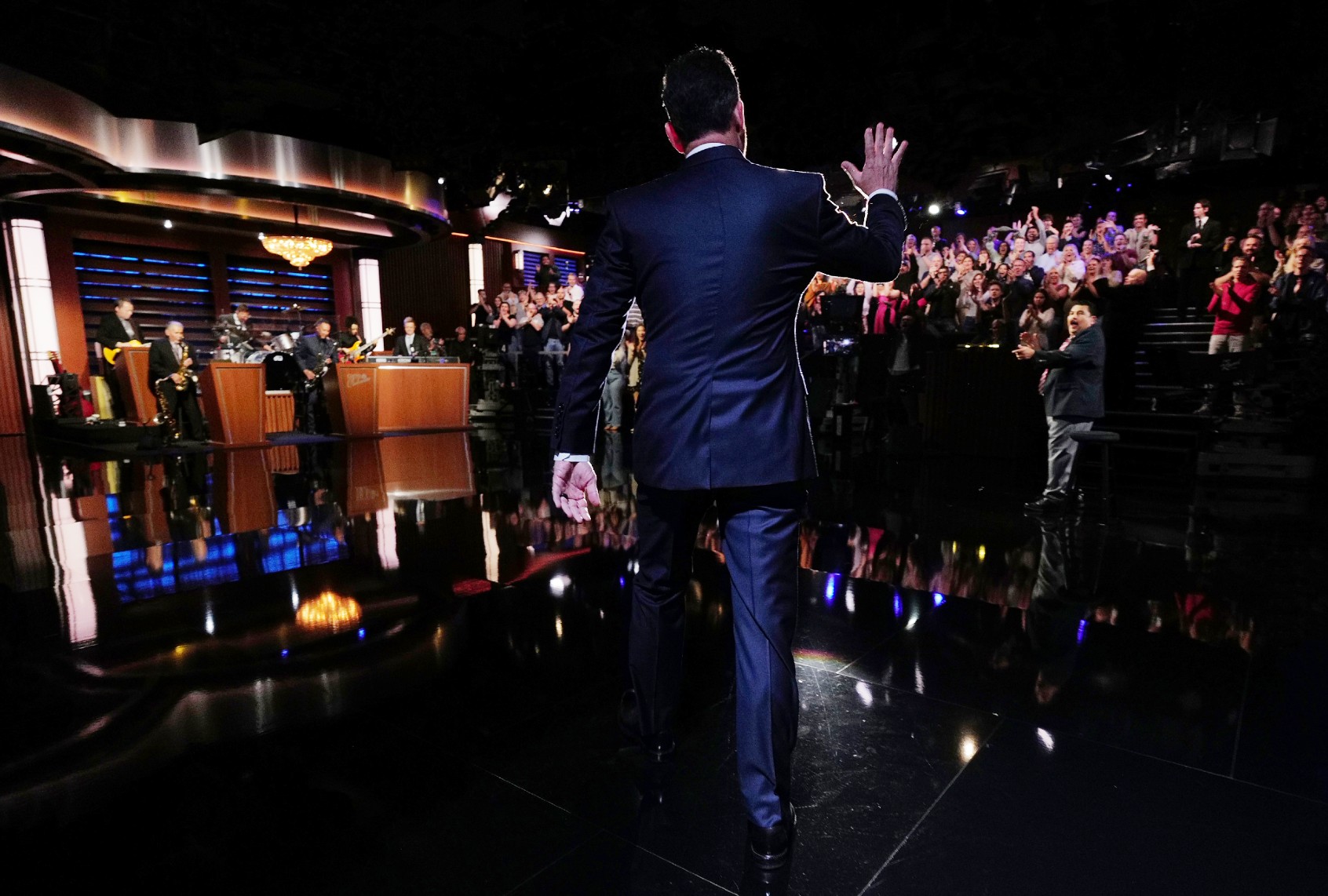First, they came for “Puppets.”
The weekly Russian satire known as “Kukly” — or “Puppets,” in English — lampooned Russian leaders by rendering them as giant latex caricatures. Not long after its 1994 launch, the show and its producing channel, NTV, flourished. At the height of its popularity, more than half of Russia’s TV viewers tuned in to its episodes, many of which featured a puppet version of former KGB officer turned politician Vladimir Putin.
In one sketch described in a 2000 Salon story, “Kukly” shows Putin’s puppet double as “a Japanese robe-wearing playboy being serviced by a bevy of painted-up prostitutes (i.e., his political cronies).”
The show’s head writer, Viktor Shenderovich, claimed Lenin as his inspiration, since it was he who dubbed politicians “political prostitutes.” “It’s just been a long time since we last witnessed such a great illustration of the metaphor,” Shenderovich claimed at the time.
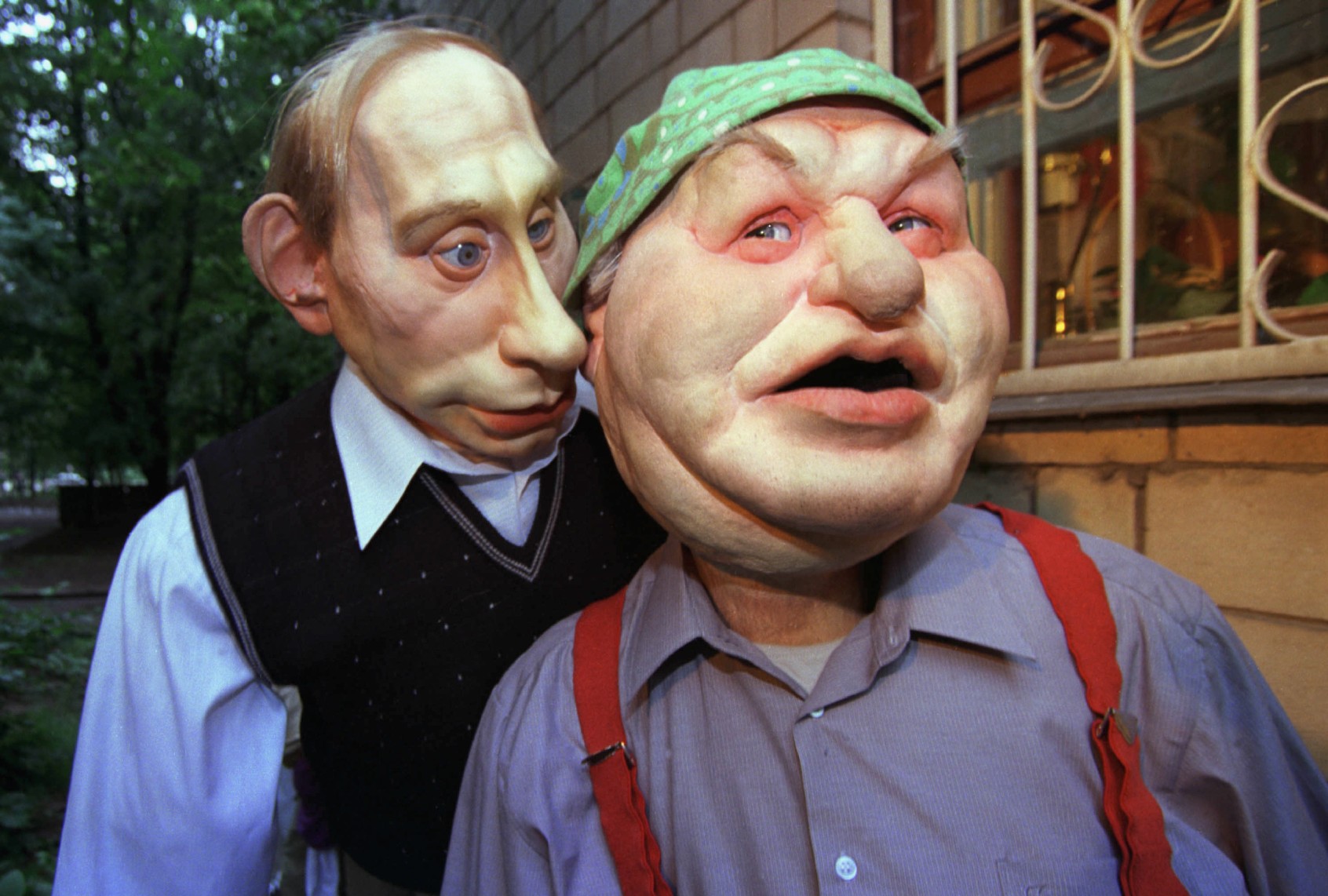
(Oleg Nikishin/Newsmakers/Getty Images) Puppet of Russian President Vladimir Putin, left, whispers a word to Moscow’s mayor Yuri Luzhkov, June 29, 2000, on the set of a popular satirical television show called “Kukly” in Moscow, Russia.
Putin was not tickled. Following the thin-skinned leader’s election to the presidency in 2000, his armed operatives raided the offices of NTV’s parent company and had its owner, Vladimir Gusinsky, jailed on embezzlement charges. Shortly after that, NTV’s ownership was transferred to a Kremlin-allied oligarch, and “Kukly” went off the air in 2002.
Satirists pose a danger to the likes of Putin and Donald Trump because they expose that their claims to greatness are illusions, and validate that the people oppressed by their governance aren’t crazy. Astute punchlines can be potent, taking on a life of their own, spreading faster and farther from their origin than nearly any official statement. Unless, say, that statement tees up a joke.
The Monday monologue joke that led to “Jimmy Kimmel Live!’” being pulled from ABC “indefinitely,” whatever that means, wasn’t one of the host’s best. Neither was it “the sickest conduct possible,” as Trump’s appointed Federal Communications Commission chairman Brendan Carr described it to far-right podcaster Benny Johnson on Wednesday.
What it constitutes is a sufficient excuse to censor someone else who Trump has long desired to silence.
Kimmel’s relentless hammering on Trump has been the centerpiece of nearly every single monologue that’s topped “Jimmy Kimmel Live!” since the first Trump administration. The only fresh addition to Monday’s show opener is that Kimmel performed it in the wake of a nationwide censuring campaign designed to punish anyone speaking ill of right-wing activist and podcaster Charlie Kirk in the days following his murder.
To be clear, Kimmel did not malign Kirk in any way. Here’s what he said: “We hit some new lows over the weekend with the MAGA gang desperately trying to characterize this kid who murdered Charlie Kirk as anything other than one of them and doing everything they can to score political points from it. In between the finger-pointing, there was grieving.”
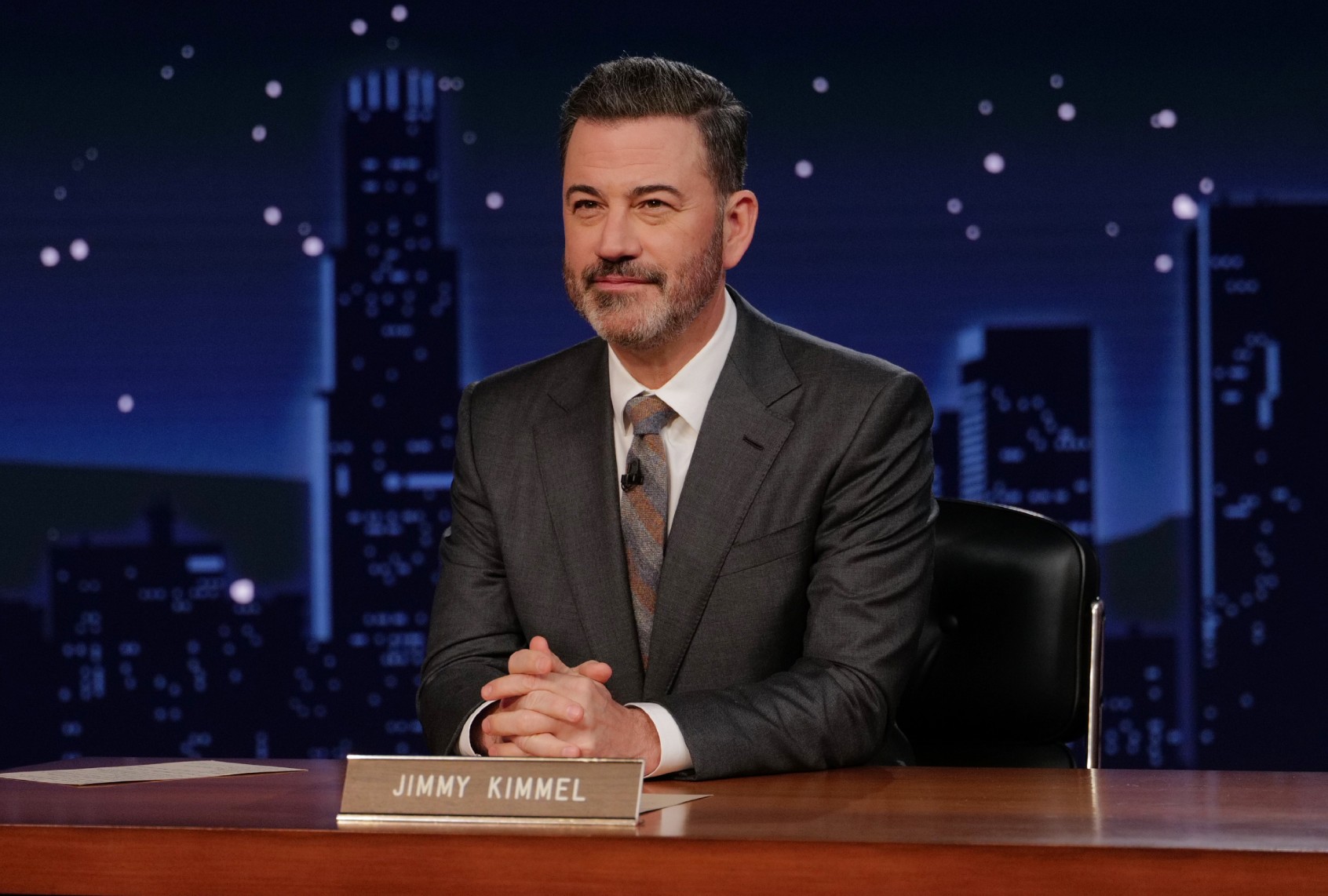
(Disney/Randy Holmes) “Jimmy Kimmel Live!”
Satirists pose a danger to the likes of Putin and Donald Trump because they expose that their claims to greatness are illusions, and validate that the people oppressed by their governance aren’t crazy.
Citing Trump’s order to fly flags at half-staff, he continued, “But on a human level, you can see how hard the president is taking this.” Cut to a gaggle outside the White House, where a reporter acknowledged that Kirk was the president’s good friend and asked how he was holding up.
Trump responds, “I think very good. And by the way, right there, you see all the trucks? They just started construction of the new ballroom for the White House, which is something they’ve been trying to get, as you know, for about 150 years, and it’s gonna be a beauty.”
“Yes,” Kimmel deadpans, “he’s at the fourth stage of grief: construction.”
A Rolling Stone report cited sources that said multiple ABC execs felt that Kimmel hadn’t crossed any lines but “the threat of Trump administration retaliation loomed.”
“They were p**sing themselves all day,” the magazine quoted an unnamed insider as saying.
Trump obsessively raged at late-night hosts and unflattering “Saturday Night Live” parodies throughout his first presidency but lacked the political machinery to do anything about them. Now he has the backing of the federal government’s regulatory apparatus, including Carr’s FCC and a Republican-controlled Congress.
Days after CBS paid Trump $16 million to settle his lawsuit alleging election interference related to a “60 Minutes” interview with former Vice President Kamala Harris, the FCC approved its parent company Paramount Global’s merger with Skydance. And for good measure, it also cancelled “The Late Show with Stephen Colbert,” claiming it was “purely a financial decision against a challenging backdrop in late night.”
“I absolutely love that Colbert got fired,” Trump posted to Truth Social that week. “His talent was even less than his ratings. I hear Jimmy Kimmel is next.”
And now, this: “Great News for America: The ratings-challenged Jimmy Kimmel Show is CANCELLED,” Trump wrote on Truth Social Wednesday. “Congratulations to ABC for finally having the courage to do what had to be done . . .That leaves Jimmy [Fallon] and Seth [Meyers], two total losers, on Fake News NBC. Their ratings are also horrible. Do it NBC!!!”
Don’t you dare, NBC. “Late Night with Seth Meyers” must be protected at all costs.
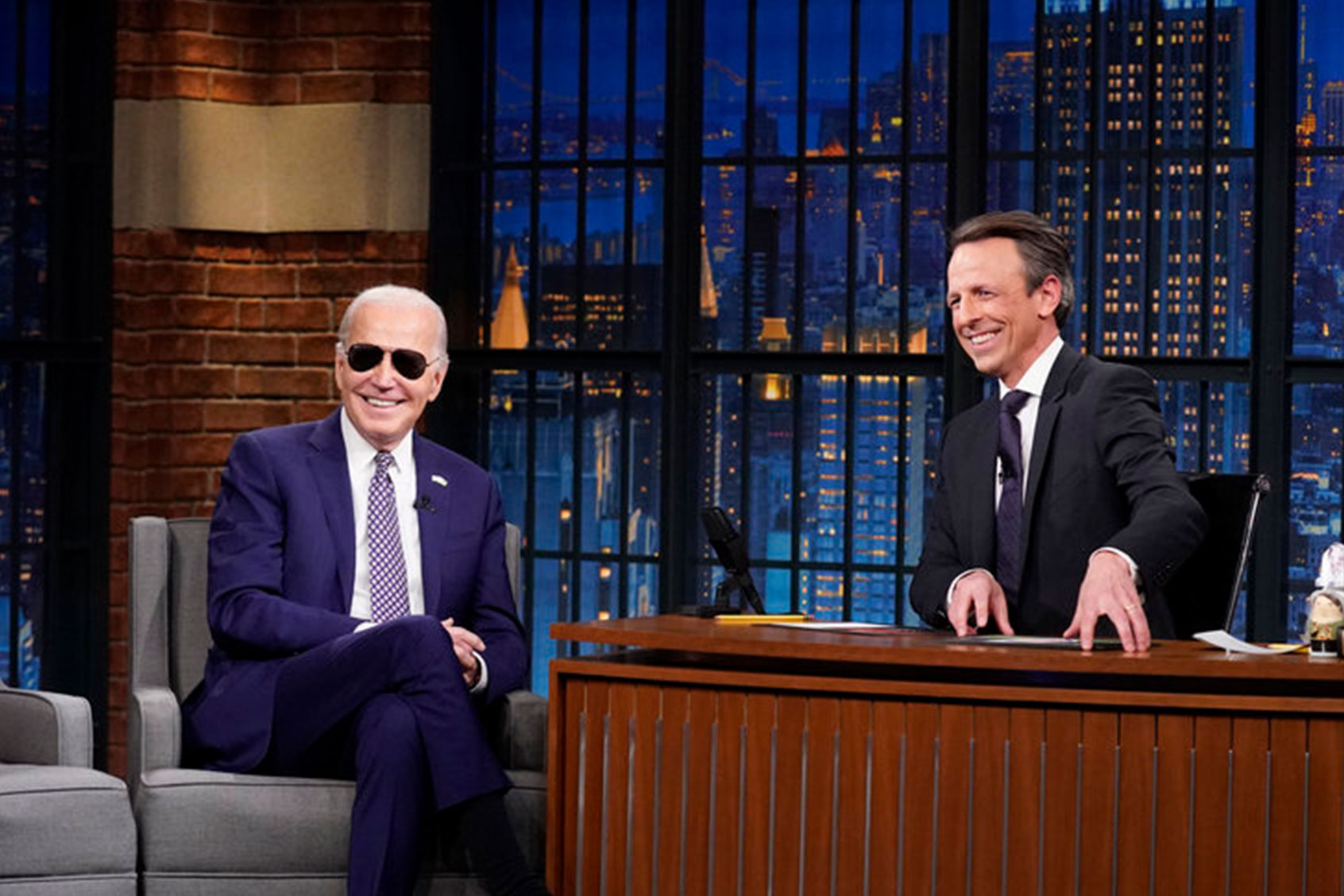
(Lloyd Bishop/NBC) President Joe Biden, during an interview with host Seth Meyers on the February 26, 2024, episode of “Late Night with Seth Meyers”
“I recognize laughter in the age of Trump as though it were a cousin of anti-totalitarian laughter,” Masha Gessen wrote in 2018. “It is the reaction to seeing act-based reality, as when ‘Saturday Night Live’ essentially reenacts White House press conferences, or when late-night comedians offer up what amounts to straightforward reportage and analysis. The hunger for a reflection of reality is so desperate that . . . one can reliably get laughs simply by quoting Trump during a public talk.”
That is pretty much what Kimmel did. The part that Carr found offensive, I guess, is that he implied that Trump’s purported despair wasn’t genuine. One can draw their own conclusions based on that clip, as Desi Lydic does on Tuesday’s episode of “The Daily Show.” She rolls her eyes, shakes her head and observes with a shrug, “Well, we all grieve in our own way.”
Among the first moves in the strongman’s playbook is to take control of the media, starting with censoring news outlets and humorists. Stand-up comics in India who speak out against Prime Minister Narendra Modi’s authoritarian overreach face death threats and intimidation from loyalists and police.
Lydic doesn’t have to fear retaliation from the White House, for now. Comedy Central’s new owner, Paramount Skydance, no longer needs to appease Carr, although if its proposed deal to acquire Warner Bros. Discovery goes forward, “The Daily Show” may be in a different situation.
Other entertainers in Trump’s sights aren’t taking chances. Jimmy Fallon bowed out of a planned appearance at the Fast Company Innovation Festival on Thursday. On that same Thursday, the co-hosts of “The View” said nothing about their late-night colleague’s suspension from the network’s lineup.
Meanwhile, on Thursday’s edition of “The Scott Jennings Radio Show,” Carr mused about having the FCC “look into whether ‘The View’ and some of the programs that you have still qualify as bona fide news programs and therefore exempt from the equal opportunity regime that Congress has put in place.”
He has turned his coup into a media tour, including a Wednesday stop by Fox News to complain that late-night hosts “went from being court jesters that would make fun of everybody in power to being court clerics and enforcing a very narrow political ideology.”
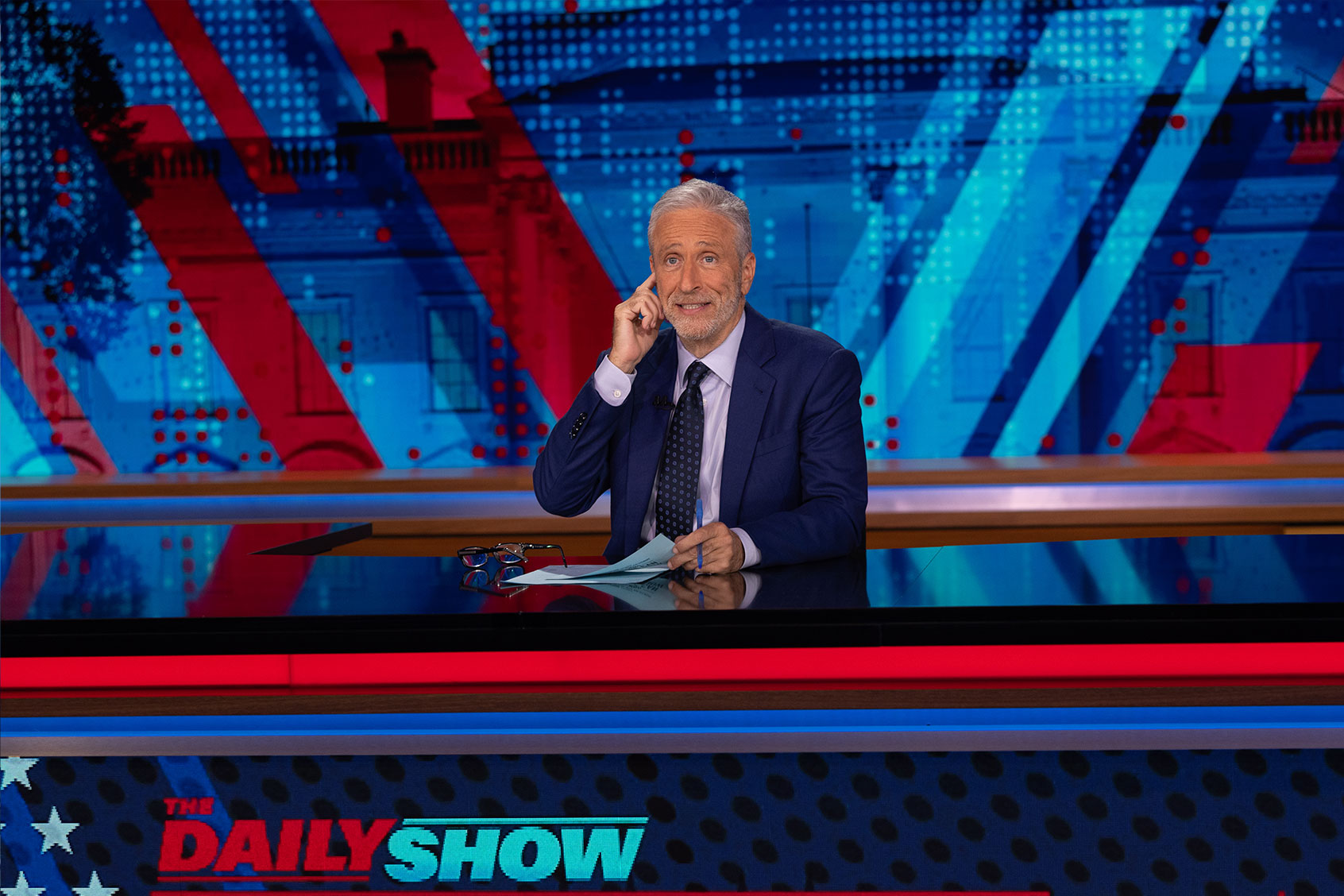
(Comedy Central) Jon Stewart on “The Daily Show” election night special
Jon Stewart ended Thursday by hosting a special “government-approved” edition of “The Daily Show,” identifying himself as its “patriotically obedient host.” With a tacky, maximalist golden background projected behind him, Stewart played that part by referring to Trump as “our Great Father” and praising the president’s verbal gaffes during his U.K. visit. Then the show’s correspondents clumsily formed a chorus of praise that collapsed into bickering, which halted when Ronny Chieng told everyone, “Calm down . . . God, is this your first dictator?”
Among the first moves in the strongman’s playbook is to take control of the media, starting with censoring news outlets and humorists. Stand-up comics in India who speak out against Prime Minister Narendra Modi’s authoritarian overreach face death threats and intimidation from loyalists and police.
Turkey has a law threatening anyone who insults its president with between one and four years in prison. That includes minors. Around 903 kids between the ages of 12 and 17 stood trial related to such charges over six years, according to a 2020 Duvar English report. Some 264 of those were between the ages of 12 and 14.
Our rights haven’t eroded to that degree, but Kimmel’s “indefinite” suspension is the most brazen evidence of this administration’s willingness to use politicized agencies against his perceived enemies. Trump has this in common with Hungarian Prime Minister Viktor Orbán, who said in 2018, “We must embed the political system in a cultural era.”
A few months into Trump’s second term, he launched ideological purges of national arts institutions and directed Congress to defund the Corporation for Public Broadcasting, dealing a crippling blow to NPR and PBS member stations. (The PBS brand is closely associated with “Sesame Street,” so in a way, our government also came for the puppets first.)
That Kimmel’s suspension is the result of a regulatory agent’s threat on a podcast is singularly alarming, but follows this course. In the past, Trump fumed that the FCC should take away broadcast networks’ licenses, but that was an empty threat because broadcasters don’t hold FCC licenses. Their affiliated stations do, and that’s who Carr threatened on Wednesday by musing about actions the FCC can take.
Disney doesn’t have pending business with the FCC, but Nexstar Media Group does. Around 30 of its stations are ABC affiliates, part of a portfolio consisting of 201 stations in 116 U.S. markets. Presently, it requires the commission’s approval to finalize a $6.2 billion merger with Tegna. Thus, Nexstar was the first to answer Carr’s call “to step up and say, ‘You know, this garbage . . . isn’t something that we think serves the needs of our local communities.”
“We can do this the easy way,” he added, “or the hard way.”
Andrew Alford, president of Nexstar’s broadcasting division, took the very easy way out. “Continuing to give Mr. Kimmel a broadcast platform in the communities we serve is simply not in the public interest at the current time,” he said in an official statement.
A few months into Trump’s second term, he launched ideological purges of national arts institutions and directed Congress to defund the Corporation for Public Broadcasting, dealing a crippling blow to NPR and PBS member stations. (The PBS brand is closely associated with “Sesame Street,” so in a way, our government also came for the puppets first.)
Conservative station group Sinclair also pulled “Jimmy Kimmel Live!” from its affiliates’ line-ups “until further notice.” It followed that by demanding that Kimmel apologize to Kirk’s family and make a donation to the right-wing activist organization he founded, Turning Point USA.
Kimmel’s brother-in-arms Colbert shared his thoughts on Thursday’s episode of “The Late Show.” “You know what my community values are, Buster? Freedom of speech!” he said, “Or as Alexander Hamilton called it, ‘Hakuna matata.’”
Lots of Americans are appalled, including the FCC’s lone Democratic commissioner Anna Gomez. “The FCC is weaponizing its licensing authority in order to bring broadcasters to heel, and to really think twice about what they say about this administration,” Gomez said Thursday at the Axios Media Trends Live conference. “That is contrary to the First Amendment. It’s contrary to the Communications Act, which prohibits the FCC from censoring broadcasters. So, any pressure on these broadcasters to alter their broadcasts because of their content is, in fact, inappropriate.”
As for what can be done, her response wasn’t encouraging. It’s up to the corporations overseeing the newsrooms and performers that are under attack to stand up for free speech, Gomez says, “because every time they capitulate rather than show courage, what they are doing is eroding our democracy on our First Amendment freedoms.” Between CBS and ABC’s news and entertainment divisions, we’re up to at least four public–facing capitulations.
Start your day with essential news from Salon.
Sign up for our free morning newsletter, Crash Course.
Fear is one of the authoritarian’s topmost tools, and satire reminds us how brittle it is. That’s the theory, anyway. In practice, fear has commanded a sizable lead in the race against satire since 9/11, when ABC cancelled Bill Maher’s “Politically Incorrect.”
Colbert and Kimmel are merely the latest casualties in this long march toward what’s shaping into a darker period than the McCarthy Era. That ended, in part, because President Dwight D. Eisenhower worked to undermine Senator Joseph R. McCarthy. This time the White House is leading the charge against the nebulous left, empowering modern McCarthy-equivalents like Carr to do his bidding. Ironically, this echoes a very Russian tradition.
Fear is one of the authoritarian’s topmost tools, and satire reminds us how brittle it is.
“Kukly” writer Shenderovich became a prominent Kremlin critic in the years that followed its cancellation before finally fleeing Russia in 2022 after the government branded him as a “foreign agent.” Nineteen years before that, in 2003, he wrote, “Of course, the problem isn’t Putin, and not those whose interests he was appointed to protect in the Kremlin, and whose interests he protects today. The problem is us, who run to heel at the first shout, fussing pettily, bought up on the cheap.”
Right now, in this land of purported free speech, those words hit close to home. One quivers at the thought of who the right’s war on free expression will claim next, but if Russia’s post-“Kukly” landscape is an indicator, the hit list may include good humor itself.
On the same day that ABC suspended Kimmel, 404 Media reported that Russia’s Ministry of Defense has debuted an AI-generated comedy featuring, among other jests, deepfake versions of French President Emmanuel Macron and Trump blabbing about golden toilets. Whether Putin appears isn’t mentioned. He probably doesn’t, since he’s the man pulling the strings.
Read more
about this topic
